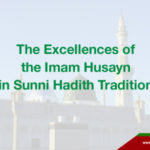The virtue of studying this chapter
In regards to the virtue of the recitation of this chapter, a tradition from the Noble Prophet says:
مَنْقَرَأَهَاسَقَاهُاللهُمِنْأَنْهَارِالْـجَنَّةِوَأَعْطيمِنَالأَجْرِبِعَدَدِكُلِّقُرْبَانٍقَرَّبَهُالْعِبَادِفِييَوْمِعِيدٍوَيَقْرَبُونَمِنْأَهْلِالْكِتَابِوَ” الْمُشْرِكِينَ”
One who recites it (Suratul Kawthar), Allah will quench their thirst from the streams of heaven and will recompense them good rewards as many as the number of every sacrifice which the servants of Allah make on the day of the Feast of Sacrifice, together with those sacrifices which are of the People of the Book and the pagans.3
The name of this chapter, al-Kawthar, is taken from the first verse of the chapter.
Commentary of the Verses
In the Name of Allah, the All-Beneficent, the All-Merciful
“إِنَّاأَعْطَيْنَاكَالْكَوْثَرَفَصَلِّلِرَبِّكَوَانْحَرْإِنَّشَانِئَكَهُوَالْأَبْتَرُ”
“Surely We have given you (Muhammad) abundance of good (al-Kawthar). ~ Therefore turn to your Lord in prayer and sacrifice. ~ Indeed your enemy is the one who will be without offspring.”
We have given you (Muhammad) much goodness!
In this chapter, similar to what is seen in Suratul Ḍuha and Suratul Inshirah, the Noble Prophet is the focal point of the address, and one of the prime objectives in all three of these chapters is to grant consolation to the Prophet in relation to the continuous painful incidents and numerous taunts of his enemies and their harsh language (towards him).
We first read: {Surely We have given you (Muhammad) an abundance of good (al-Kawthar).}
The term “أَلْکَوْثَرُ” is the descriptive case derived from the (Arabic word) “كَثْرَتٌ” which means “ample goodness or blessings” and those individuals who are extremely generous are also referred to as “al-Kawthar”.
What is the purpose of using the term “al-Kawthar”?
It is mentioned in the narrations that: When this chapter was revealed, the Noble Prophet ascended the pulpit (mimbar) and recited it. His companions asked him what it was that Allah had given him and he answered: “It is a stream in paradise, whiter than milk, more clear than a goblet (made of crystal), and on either side are domes decorated with pearls and rubies.”4
In a tradition from Imam Jafar as-Sadiq he says: “Al-Kawthar is a stream in paradise which Allah has granted to His Prophet in exchange for his infant son (ʿAbdullah) who passed away during the life of the Prophet.”
Some scholars have stated that “al-Kawthar” is a ‘Pool of Abundance’ which belongs to the Prophet from where the believers will quench their thirst when they arrive in paradise.5
Other opinions of ‘al-Kawthar’ include the following:
Some have commented on it as being ‘prophecy’;
Others mention that it is the Qur’an;
Another opinion is that it refers to an abundance of companions and followers of the Prophet ;
Yet another interpretation is that it refers to the abundance of descendants all of who will come from his daughter, Fatima Zahra’, and will increase to such an extent that it will be impossible to count them.
They do not only exist today, but in fact will continue to remain until the hereafter as reminders of the Noble Prophet ;
Some have also commented on this term referring to ‘intercession’ and have narrated a tradition from Imam Jafar as-Sadiq in this regards.6
Even the Sunni scholar, Fakhr ad-Din al-Razi has narrated fifteen different narrations on the meaning of ‘al-Kawthar’, however most of them are merely statements of the clear examples of this broad concept, because as was mentioned before, ‘al-Kawthar’ means ‘goodness and blessings in abundance’, and we know that Allah the Grand, granted the Noble Prophet so many blessings such that each of the ones mentioned above is but one clear example of them.
There are many other examples that may be cited as commentaries for the verse; however we will mention them here.
All of the Divine gifts granted to the Noble Prophet in every aspect – such as the victories in his expeditions against his enemies; the scholars of his community who in every era and age, guard the illuminated torch of Islam and the Qur’an and carry it throughout the world – all in all are contained in this ‘abundance of goodness’.
It should not be forgotten that Allah revealed these verses to His Prophet’s blessed heart at a time when the manifestations of this ‘abundance of good’ had not yet appeared.
It was a miraculous piece of news which he was informed about and was to transpire in the near and remote future to confirm the legitimacy of the Noble Prophet .
This great blessing and the ‘abundance of good’ should have a lofty level of thanks (to be given to Allah ), although creatures can never entirely thank the Creator for His blessings because even the ability to be thankful is another blessing from Him which needs thanks. Therefore, Allah
says, {Thus, turn towards your Lord in prayer and (offer the) sacrifice.}
He is the One who grants these blessings, therefore prayer, worship and sacrifice – which is also a kind of worship in itself – has no meaning unless it is done solely for the sake of Allah , particularly in regard to the meaning of the term Lord (رَبِّ) which indicates the constancy of grace and providence.
Briefly it can be stated that: ‘worship’ – whether it be in the form of the salat (prayer) or making a sacrifice of an animal, is only the Lord’s and Benefactor’s privilege, and it is exclusively for the Pure Supreme Being – Allah – to be directed towards.
This portion of the verse refers to the behavior of the pagans who used to prostrate and sacrifice animals to the idols, while they knew their thanks for all of the blessings that they had been given truly belonged only to Allah, and the phrase ‘your Lord’ (لِرِبِّكَ) used in this verse, is a clear evidence for the necessity of pure intentions in all acts of worship.
Many commentators believe that the meaning of salat in this verse is the salat on the Day of the Feast of Sacrifice (Eid al-Qurban), and making the sacrifice of an animal on that day. However, the meaning of the verse is apparently general in its scope and inclusive of many other types of prayers, even though salat and the sacrifice of the Day of the Feast of Sacrifice are clear examples of this term.
Perhaps the use of the term “وَانْحَرْ” or ‘offer sacrifice’ which comes from the root ‘نَحَرَ’ and is specific to the process of slaughtering a camel has been employed because among all of the animals which can be slaughtered (on the Day of the Feast of the Sacrifice and also in general), the camel is the best of them, and among the early community of Muslims, we know that they had a great fondness of slaughtering (and eating) the camel and that slaughtering a camel was not possible without a show of generosity (due to its great worth and value).
Here are two more commentaries which have been offered on the above verse:
- The implied meaning of the phrase “وَانْحَرْ”is to face the qiblah (the Kaʿbah) when performing the salat. This interpretation is given because the word“نَحَرٌ” originally meant the ‘throat’, and then later on it was used by the Arabs to mean the act of ‘standing in front of anything’.
It is for this reason that the Arabs say, “مَنَازِلُنَاتَتَنَاحَرُ” meaning that “Our stations are opposite of one another.”
- Another meaning is the raising of the hands up to the face and neck when pronouncing the ‘takbir’ (to begin the salat).
In a tradition we read that when this chapter was revealed, the Noble Prophet asked Gabriel : “What is this“نُحَيرَة”that my Lord has commissioned me to do? Gabriel said: “This is not “نُحَيرَة”; rather Allah has commanded you to raise your hands at the beginning of prayer when you say “أَللهُأَكْبَرُ”and also every time when you are going to perform the ruku or sajdah and after that (particular act), because our prayer (salat) and that of the angels in the seven heavens is exactly like this. Everything has an adornment and the adornment of prayer is raising the hands at the time of saying “أَللهُأَكْبَرُ”.7
In another tradition, this one from Imam Jafar as-Sadiq who on the commentary of this verse, indicated with his hands and said: “The meaning of this verse is that you raise your hands in such a way that your palms face towards the qiblah (the direction of the Kabah).”8
However the first commentary given is the most appropriate in regards to what this verse means, since its meaning was to negate the actions of the idolaters who used to perform acts of worship such as the sacrifice of animals for other than Allah .
However with this said, there is also no problem in combining all of these meanings together and in particular, there are many narrations about raising the hands at the time of saying “أَللهُأَكْبَرُ” and there are traditions in the books of the Shia and the Ahlus Sunnah in this regards, and therefore this verse can have such a vast meaning that it covers all of them.
In the last verse of this short chapter, keeping in mind the taunts made by the chiefs of the pagans towards the Noble Prophet, we read,
{Surely your enemy is the one who will be without offspring.}
The term “شَانِي” or ‘enemy’ is derived from the word “شَنَئَآنٌ” which means ‘enmity, spitefulness, and bad manners’; thus, the word “شَانِي” is the one who possesses these characteristics.
It is worthy to note that the word “أَبْتَرُ” originally meant ‘an animal whose tail is cut off’ and the enemies of Islam taunted the Noble Prophet by using this word.
In reality, the usage of the term “شَانِي” clearly shows that in their desire to express their enmity towards the Prophet 9, these people did not even display the smallest amount of respect or dignity – meaning that their enmity was interwoven with hard-heartedness and the use of shameful words! In reality, the Qurʾan retorted to such individuals and told them, “It is actually you who have this characteristic (of being cut off of your posterity) and not the Noble Prophet!”
In addition, just as has been mentioned in regards to the history of revelation of this chapter, the Quraysh were waiting for the death of the Prophet to transpire as they felt that with his departure from this world and since he had no son to inherit his position, the dissolution of the rule of Islam would happen.
But the Qur’an, consoling the Noble Prophet told him that it is not him who will be without offspring, but surely his enemy is the one who will not continue on!
Points of Interest
- Lady Fatima and al-Kawthar
It was said earlier that ‘al-Kawthar’ has a vast, inclusive meaning which is ‘goodness in abundance’ and the examples are many.
A large number of scholars of the Shia school believe that one of the most clear examples of this word is the auspicious existence of Fatima Zahra, because the occasion of the revelation of the verse indicates that the enemies accused the Noble Prophet of being without offspring to which the
Qur’an replied: {Surely (Muhammad) We have given you abundance of good (al-Kawthar).}
From this verse we understand that this ‘abundance of good’ is that very Lady Fatima Zahra’.
In addition, not only is it the physical and biological offspring of the Prophet which will increase, rather it is these abundant number of offspring scattered which continue his religion and are responsible for the preservation of all of the values of Islam and continue to convey it to the future generations!
This is not only limited to the infallible Imams of the Ahlul Bayt who have a literal number that we can enumerate (12), rather it is the thousands and thousands of children of Fatima which have spread around the entire world from whom so many great scholars, scientists, writers, exegetists, jurists, narrators of the Prophet’s sayings and leaders have come from – individuals who have left outstanding works and unmatched fame in this world, and have protected Islam with their selfless giving (of themselves and their efforts) and their hard work and devotions.
Here, we encounter a very interesting discussion from Fakhr ad-Din al-Razi who along with other commentators on ‘al-Kawthar’, says:
The third statement of the meaning of this chapter is that it was revealed to reject those who criticized the Noble Prophet for his lack of progeny.
Therefore the meaning of this chapter is that Allah will give him a generation which will remain throughout all of the ages.
Considering the fact that how many members of the Ahlul Bayt have been martyred, we still see that the world is replete with them, whereas the Umayyads (who were the enemies of Islam) there remains no mentionable figure in the world.
Then, behold and see how many of the great men of leadership such as al-Baqir, as-Sadiq, al-Ridha, and Nafs al-Zakiyyah 9, etc… are found among them (the household)!”10
References:
- 3. Majmaʿ al-Bayan, vol. 10, pg. 548
- 4.Majmaʿ al-Bayan, vol. 10, p. 549
- 5.Ibid.
- 6.Ibid.
- 7.Majmaʿ al-Bayan, vol. 10, p. 550
- 8.Majmaʿ al-Bayan, vol. 10, p. 548
- 9.Nafs al-Zakiyyah is another name for Muhammad b. ʿAbdullah, the grand-son of Imam Ḥasan al-Mujtaba who was martyred by Mansur al-Dawaniqi in 145 ah.
“Fatima Zahra’ in the Noble Qur’an” by Ayatullah al-`Uzma al-Hajj ash-Shaykh Nasir Makarim Shirazi








